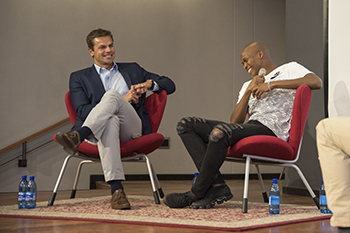Latest News Archive
Please select Category, Year, and then Month to display items
12 October 2020
|
Story Arina Engelbrecht
|
Photo Supplied
 Arina Engelbrecht from Organisational Development and Employee Well-being believes physical activity has a number of benefits for one’s health, including stress relief.
Arina Engelbrecht from Organisational Development and Employee Well-being believes physical activity has a number of benefits for one’s health, including stress relief.
Being physically active plays a big role in preventing the development of mental-health problems and in improving the quality of life of people experiencing mental-health problems.
Treatment for depression
Physical activity can be an alternative treatment for depression. It can be used as a stand-alone treatment or in combination with medication and/or psychological therapy. It promotes all kinds of changes in the brain, including neural growth, reduced inflammation, and new activity patterns are formed that promote feelings of calm and well-being. It releases endorphins – powerful chemicals in the brain that energise your spirit and make you feel good.
Physical activity can be very effective in relieving stress. Research in adults has found that physically active individuals tend to have lower stress levels compared to individuals who are less active. It also leads to improved sleep. When a person sleeps better and feels more rested, overall quality of life improves. They cope better with daily life stressors.
Reduce Alzheimer's risk
Regular physical activity can reduce your risk of developing Alzheimer's disease by up to 50%. It can also slow down further deterioration in those who have already started to develop cognitive problems. It stimulates the brain’s ability to maintain old connections as well as to make new ones.
A study asked people to rate their mood immediately after periods of physical activity (e.g. going for a walk/run, cycling, doing housework) and periods of inactivity (e.g. reading a book or watching television). Researchers found that participants felt more content, more awake, and calmer after being physically active compared to after periods of inactivity.
In conclusion, people who are physically active feel a sense of well-being, feel more energetic throughout the day, sleep better at night, have sharper memories, and feel more relaxed and positive about themselves and their lives.
“Being physically active not only changes your body, it changes your mind,
attitude, and your mood.” – Arina Engelbrecht
Luvo and Ryk inspire UFS student leaders
2017-10-13

Ryk Neethling and Luvo Manyonga have a special bond.
The sporting duo shared their inspiring stories with student
Leaders of the University of the Free State.
Photo: Kaleidoscope Studios
Dreams can come true and Luvo Manyonga’s story is the perfect example. It would make the ideal movie script. This is opinion of the businessman and former international swimmer Ryk Neethling.
The Olympic gold medallist and former World Champion and Manyonga shared their stories with new student leaders of the University of the Free State (UFS).
“I am so proud of this guy,” Neethling said. “And we are just half-way through this movie. The best is yet to come.” The 26-year-old Manyonga is the current Olympic silver medallist and World Champion in long jump. But he had to overcome huge obstacles as a former tik or crystal meth addict.
Not an easy road
The duo were guests for a session, Inspirational Stories of Lived Humanising Experiences, which was part of the university’s Student Leadership Training weekend for Student Representative Councils, Residence committees, Residence Assistants and Association Representatives in the Economic and Management Sciences Auditorium on the Bloemfontein Campus.
Manyonga, who is dating the Kovsie netball player Khomotso Mamburu, talked about growing up in Mbekweni township in Paarl, about his career and his setbacks.
After finishing fifth at the IAAF World Championships in Daegu, South Korea, in 2011 he started partying when he returned home. “I hooked up with the wrong friends and they introduced me to tik,” he said. “They told me: ‘Hey dude, you are drunk. Just take a hit and it will sober you up.’ I took it and it was nice, but that is where it started.”
Be surrounded by positive people
Manyonga lost all his money and his sport was also suffering because of his addiction. “At the beginning of 2014 I started to realise that I was throwing my life away and I needed help. I went to reach out to people close to me and told them I had a problem.” He thanked Neethling, who helped him when he was at his lowest, his mother, the South African Sports Confederation and Olympic Committee, Tuks Sport and the High Performance Centre where he trains for the influence on his life.
Neethling’s advice to student leaders was to dream big, work hard, expand your network and find a mentor you can learn from.
“Always surround yourself with positive people,” he said. “You can succeed if you stay positive.”